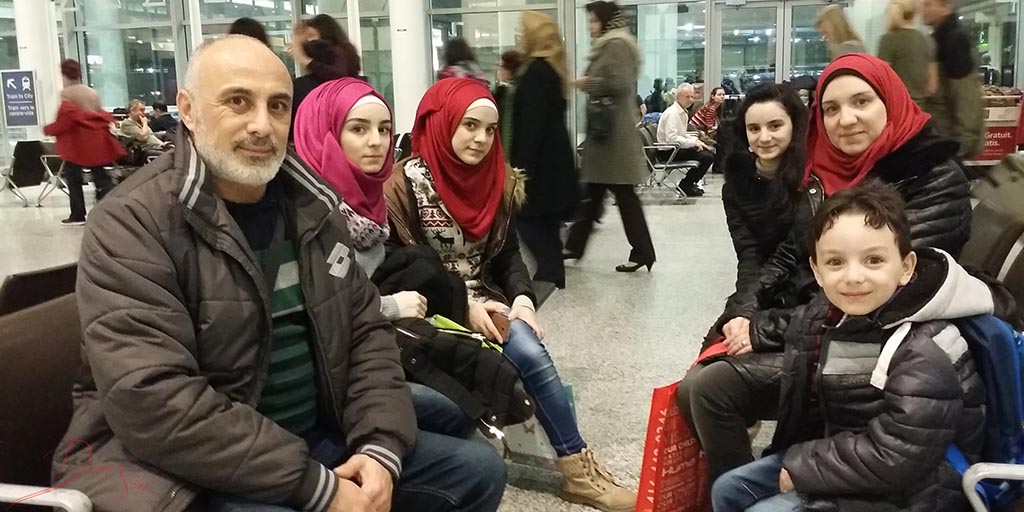Rumours of Grace: Opening borders: An act of faith
 CREDIT: DOMNIC SANTIAGO ON FLICKR
CREDIT: DOMNIC SANTIAGO ON FLICKRThe first Syrian refugee family landed in Toronto on Dec. 9, 2015. Canada has opened its arms to families fleeing war-torn areas, but other countries have not followed suit.
It was a bit awkward to watch him refusing to shake the hand of German chancellor, Angela Merkel. In ignoring her request during their photo op the U.S. president communicated that the two have their differences.
Among them is the way they regard their borders. The U.S. president is working hard to limit the number of immigrants and refugees into his country. She, on the other hand, has made strong efforts to resettle hundreds of thousands of them in Germany.
Last Sunday morning, during the Christian worship service I was leading, we looked at the 23rd chapter of Exodus in the Bible. This passage took shape about 3,500 years ago while the Israelites were on the journey of their lives. They were en route to the “Promised Land” after having spent several hundred years in slavery. Their taskmasters, Egyptians, had taken to killing newborns to control the growing Israelite population.
In the second half of the chapter, God promises to miraculously and gradually have the Israelites displace the tribal groups that at the time occupied that land. These groups had been jostling and struggling to claim the different portions of the area.
Nevertheless, it appears that non-Israelites would remain welcome in the land. God, in verse 12, commands his people to be sure that “foreigners”, as well as the Israelites themselves, were not to work without rest. Foreigners were to be given one day a week off from work. They were to be “refreshed”.
A reader today may wonder if the Israelite leaders had security concerns about allowing potential enemies to remain in their country. No doubt, there were those who argued that aliens and foreigners should be expelled, and prevented from crossing the borders back to their homes.
Today, churches all over Canada are waiting for refugees to arrive. They have filled out the applications, secured housing, gathered furniture and generated support networks for the families they hope will arrive. They are not alone. Though churches are likely offering the largest number of opportunities for refugees, other community organizations, some created specifically to sponsor refugees, are in the game.
Is Canada being too careless in allowing churches and others to create hospitable places for refugees?
One can, and many do, mount arguments to limit the number of refugees and immigrants into the country. They present security risks. They will have a hard time fitting in because they come with different religions and social values. Some will end up consuming our social service resources. A number may return to their home countries if given the opportunity.
In the end, opening borders to refugees and immigrants is an act of faith. It says, “We will never be able to fully understand the dangers or the opportunities we are exposing ourselves to when we let into the country. But we believe. We have faith that you have it in you to do well when you enter our country. And we believe that in some way, we are responsible to a higher code than mere self-preservation; a higher power than our security calculations; and a higher love than the love of a risk-free existence.”
Many centuries ago a large group of former “foreigners”, slaves in Egypt now freed, migrated to their promised land to establish themselves. God commanded them to never treat other foreigners as they had been treated. He commanded that they be treated not only with compassion, but also with dignity.
Today churches throughout Canada claim that God’s command to be available and open to the foreigner is still in play. They call upon all to work together, to strive less in fear and more in hope, less with an eye towards self-preservation and more with a resolve to embrace the struggling, less with a desire to close our borders and more with a determination to share the blessings the country has to offer.
Editorial opinions or comments expressed in this online edition of Interrobang newspaper reflect the views of the writer and are not those of the Interrobang or the Fanshawe Student Union. The Interrobang is published weekly by the Fanshawe Student Union at 1001 Fanshawe College Blvd., P.O. Box 7005, London, Ontario, N5Y 5R6 and distributed through the Fanshawe College community. Letters to the editor are welcome. All letters are subject to editing and should be emailed. All letters must be accompanied by contact information. Letters can also be submitted online by clicking here.














